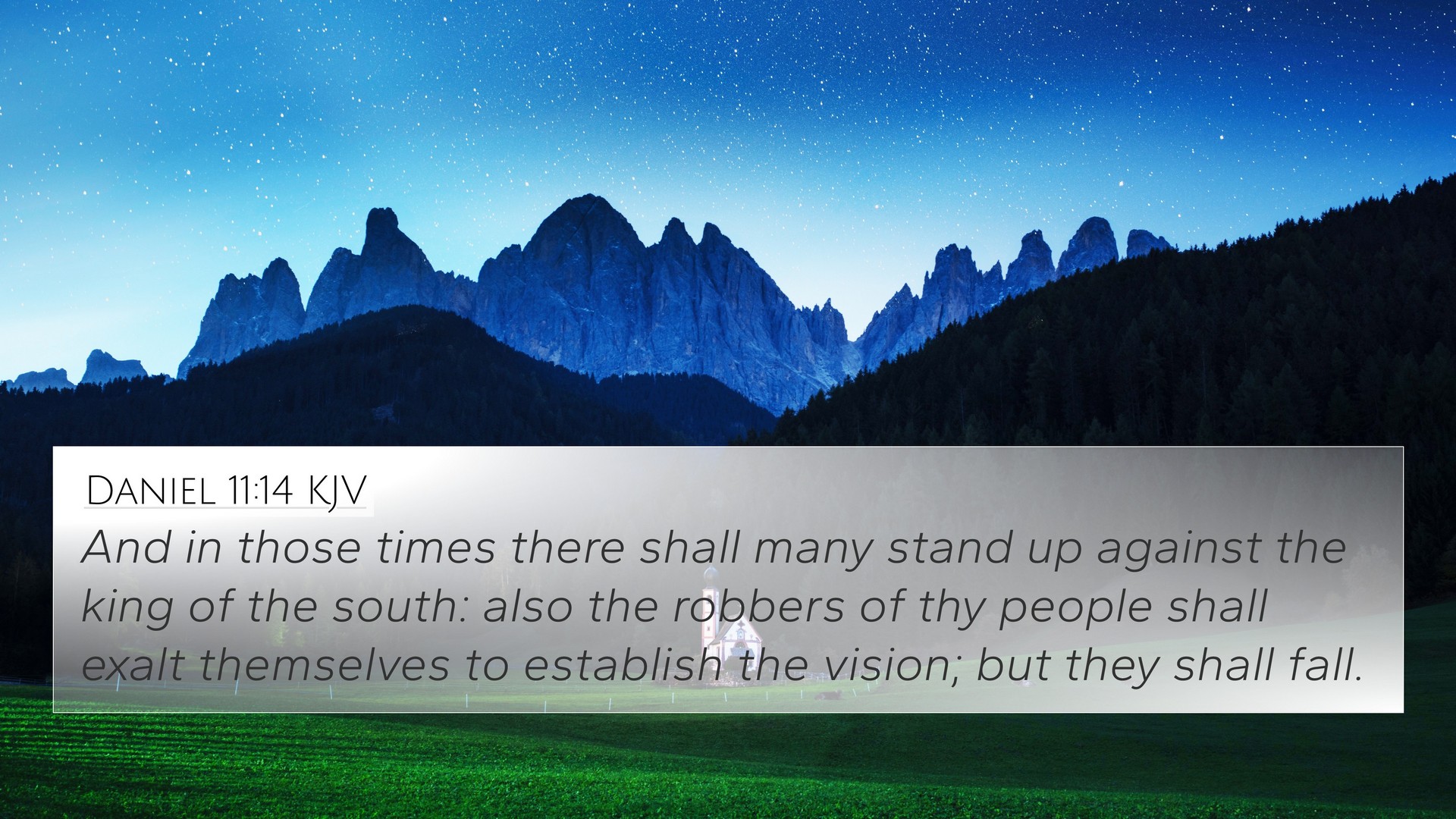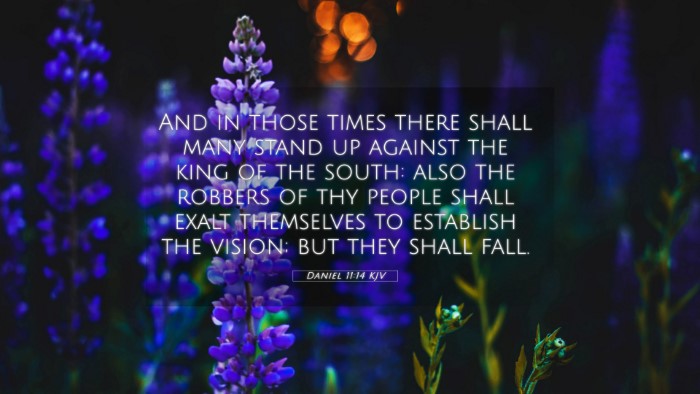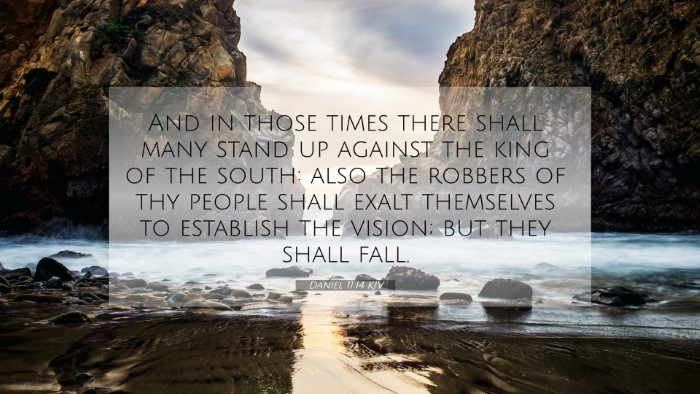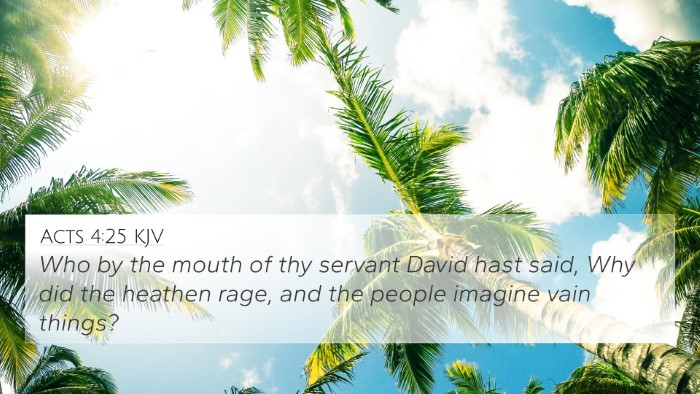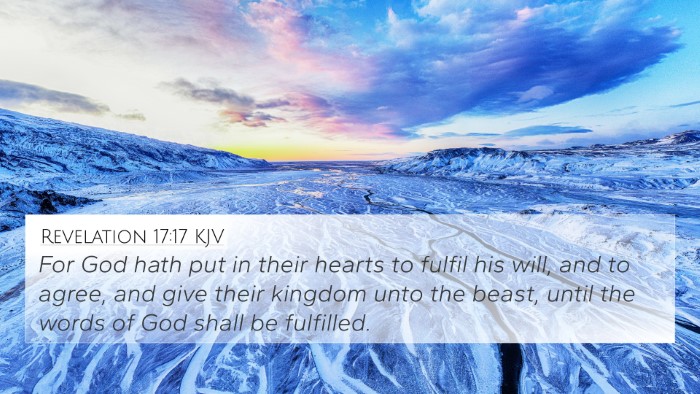Understanding Daniel 11:14
Daniel 11:14 states, "And in those times there shall many stand up against the king of the south: also the robbers of thy people shall exalt themselves to establish the vision; but they shall fall."
This verse occurs within a broader context of prophecies concerning the struggles between the kings of the north and south, often interpreted as representing historical conflicts that unfolded during the Hellenistic period. The term "king of the south" often refers to Egypt, while the "king of the north" represents Syria or its rulers.
Summary of Commentary Insights
Drawing from the insights of Matthew Henry, Albert Barnes, and Adam Clarke, several themes emerge regarding Daniel 11:14:
-
Historical Context: The verse reflects a turbulent period in Jewish history, where adversaries sought to oppress the people of Israel. The mention of "many standing up against the king of the south" indicates a time of resistance and upheaval.
-
Role of the "Robbers": The phrase "the robbers of thy people" is interpreted as factions or leaders within Israel rising against foreign oppressors. Matthew Henry speaks of these as those who rebel for the sake of maintaining their faith and hopes toward God's promises, establishing "the vision," which refers to God's determined plans for His people.
-
Divine Sovereignty: According to Albert Barnes, the ultimate falling of these coordinated efforts emphasizes God's control over the historical outcomes. Even amidst struggle and conflict, God's overarching purpose prevails, resonating with other Biblical themes of divine providence.
-
Prophetic Fulfillment: Adam Clarke notes that the prophecies outlined in this chapter illustrate the unfolding of God's plan through historical events, mirroring the challenging circumstances faced by the Israelites during periods of foreign domination.
-
Religious Implications: The aspirations of the "robbers" to establish the vision highlight a significant longing among the Jewish people for divine restoration and the fulfillment of God's covenantal promises.
Cross-References and Connections
This verse can be linked to several other Biblical passages that explore similar themes or historical events:
- Exodus 14:13-14 - God's assurance of deliverance, resonating with the themes of hope amidst adversity.
- Isaiah 10:27 - God breaking the yoke of oppression, highlighting His power and sovereignty over earthly kings.
- Matthew 24:6-7 - Jesus speaking of conflicts in the end times reflects ongoing spiritual warfare faced by believers.
- Revelation 17:14 - The ultimate victory of the Lamb as a fulfillment of God’s promise against earthly powers.
- Daniel 8:25 - Mention of the ambitious yet failure-prone leaders paralleling the struggles presented in chapter eleven.
- Zecharaiah 1:14-15 - Understanding God's indignation against nations that oppress His people brings depth into the discourse of conflict.
- Micah 4:11-12 - Assurance of God's oversight amidst Israel's struggles illustrates continuity in God's redemptive work.
Connecting Bible Verses
Understanding Daniel 11:14 through the lens of other Scriptures encourages a deeper exploration of the spiritual implications of adversity, hope, and divine sovereignty. Here’s how the connections manifest across the scriptures:
-
Thematic Analysis: This verse presents a theme of struggle against oppression, which is prevalent throughout both the Old and New Testaments, as seen in the experiences of the Israelites and the early Church.
-
Comparative Studies: A comparative study of prophetic writings in Isaiah and Revelation alongside Daniel illuminates the continuity of prophetic themes concerning edification and danger.
-
Inter-Biblical Dialogue: Enabling dialogue between these texts helps readers recognize how the trials faced by God's people in Daniel's time resonate within contemporary struggles for faith and justice.
Conclusion
Daniel 11:14 serves as a powerful testament to the historical and spiritual realities faced by God's people amidst turmoil. The convergence of struggle and hope within the prophetic narrative beckons readers to partake in a larger theological discourse about divine sovereignty and fulfillment of God's plans through history. As one reflects on this verse, the interconnectedness with other Biblical texts enhances an understanding of both the specific context of Daniel’s prophecy and the broader narrative of God’s redeeming actions through history.
Exploring Bible verse cross-references and connections between Bible verses can yield profound insights not only into specific passages like Daniel 11:14 but also into the thematic messages that run through the entirety of Scripture. Utilizing resources such as Bible concordances and Bible cross-reference guides will aid in uncovering these deep and rich interconnections, facilitating a more rewarding journey through the text.
